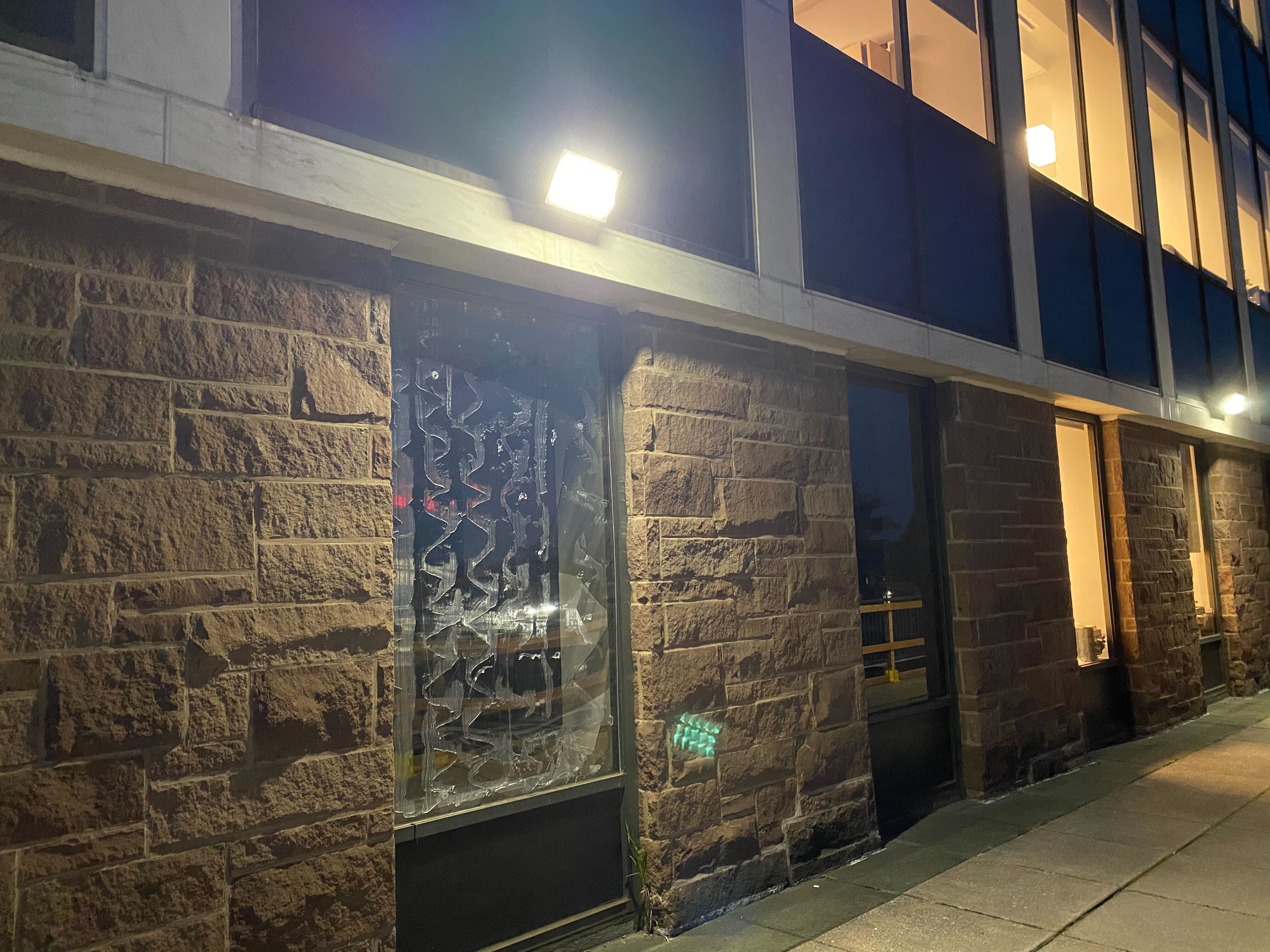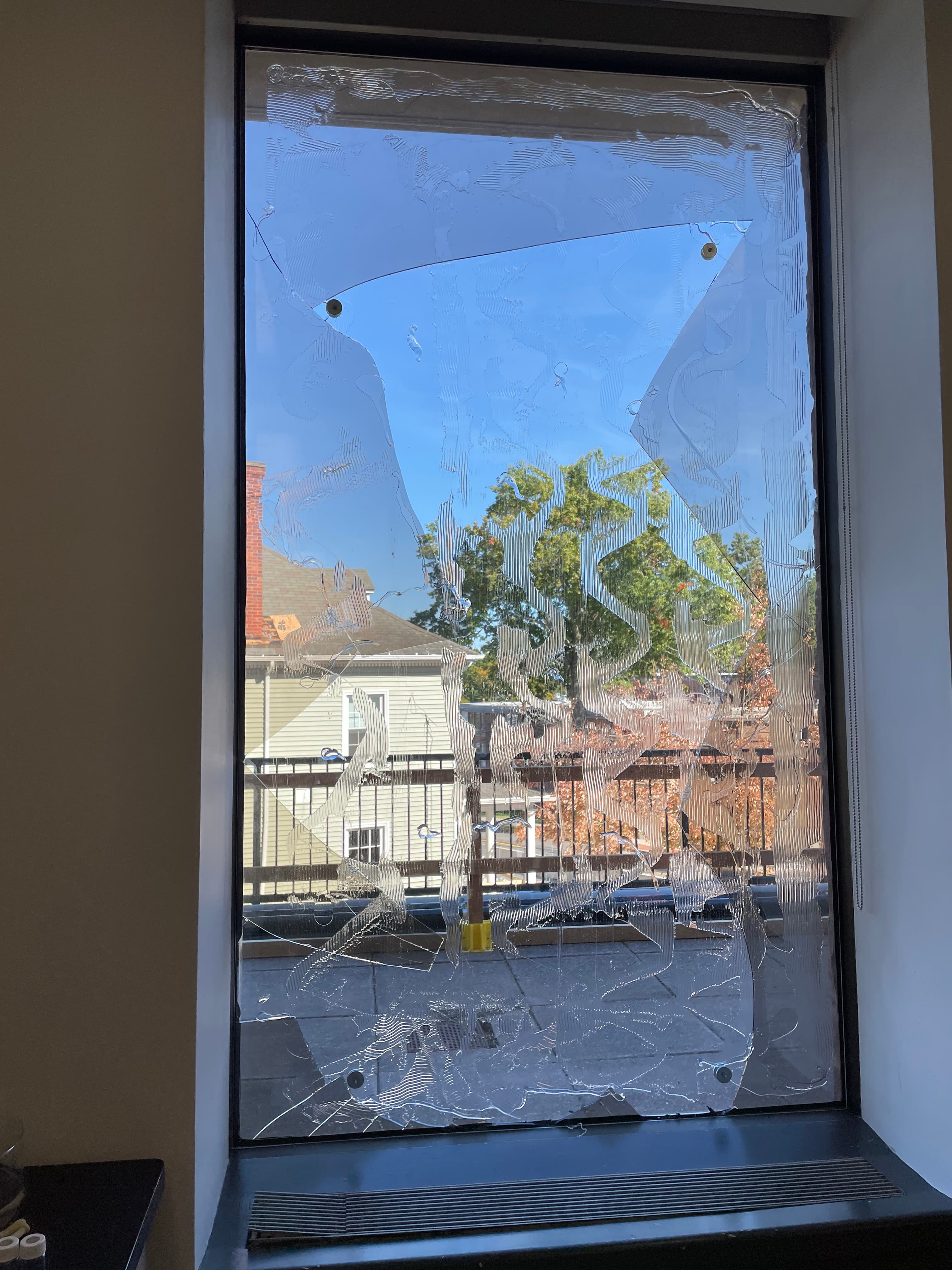
c/o Anne Kiely, Head Features Editor
An unknown individual shattered an east-facing window of the Elling Laboratory, located in room 28 of Hall-Atwater Laboratories, on Sunday, Oct. 2, between 2 a.m. and 3 a.m. No items were reported missing, and no one was reported injured. There was no evidence of any object being used to break the window, and it is currently unclear how exactly the window was broken.
The broken window was reported by a student passing by Hall-Atwater around 3 a.m. According to Director of Public Safety (PSafe) Scott Rohde, the window appears to have been broken as an act of vandalism.
“It was smashed from the outside in,” Rohde said. “It does not appear anyone entered the space or anything was taken…. Not really a break-in, more of damage to property with the window being smashed.”
Rohde proposed that someone may have used a Bird electric scooter—which have been scattered around campus since the start of the semester—to break the window.
“It’s unknown for sure what broke the window, but there is some speculation that a Bird scooter may have been used, and my understanding is that there were several Birds in the area,” Rohde said. “But they don’t know for sure if that’s what was used because there was nothing found inside like a rock or something [like] a piece of wood or bat someone held to do the damage. I don’t know for sure if it was a scooter, but that was what happened [to be] there.”
There are a few other theories floating around about what may have happened. Manager of Scientific Facilities and Instrumentation Camille Keeler believes it may have been a person hitting the window with their body.
“It’s a bit of a mystery and I’m suspicious that a person may have accidentally, or purposefully, slammed into the window and walked away,” Keeler wrote in an email to The Argus.
Assistant Professor of Chemistry Benjamin Elling, who runs the lab, speculated that partygoers slammed into the window and walked away. He guessed that drunk students were walking home after a party and had to pass by his lab because of the science building construction happening near Exley and Hall-Atwater, inspiring them to smash his window.
“All I’ve heard from students in my group who are on Yik Yak and things like that is that people noticed maybe around 2:00 [a.m.] that a window had been smashed, and there had been a couple [of] parties going on in the area,” Elling said. “Definitely not a freak force of nature. It was definitely a real person who decided to do some smashing.”
Fortunately for Elling and his students, nothing appeared to have been broken or stolen within the lab itself, and no one was reported injured.
“It was definitely no one trying to rob the lab or anything ’cause…nothing was taken, no evidence anyone jumped in,” Elling said.
Even though this kind of incident doesn’t happen often in Hall-Atwater, the windows in front of Exley Science Center are damaged about once every four years.
“[Physical Plant Director of Environmental Services William Nelligan] says that, if you’re here for four years, there’s a 100% chance that he’s gonna be replacing another window,” Elling said. “So this is not the first time this has happened, but [the] first time since I’ve been here that someone has smashed [a window].”

c/o Caleb Henning, Staff Writer and Financial Manager
Environmental Services has fixed the window in Elling’s lab with plexiglass as an interim solution.
“On the outside and the inside, they have just a piece of plexiglass for now, just to keep the elements out,” Elling said. “Eventually this will be replaced with glass, but for now we just have this art installation in the lab. They haven’t given me any updates about when the repairs will happen.”
Rohde clarified that although vandalism is a criminal act, the Middletown Police Department will not be involved in the incident unless it proves to be a repeated occurrence.
“Significant vandalism to the university property would be taken to the police,” Rohde said. “A broken window really doesn’t fit that bill. We would normally just repair that. If a pattern of that kind of vandalism begins—if we had many broken windows, week after week—yes, we would involve the police.”
Rohde advised that prevention and quick reporting on issues like this would help to keep them from happening more often. He emphasized the importance of adequate lighting and having PSafe officers check areas while they lock up buildings.
“I’m not overly concerned that this is a pattern or a trend,” Rohde said.“But it’s always good to remind people that if you see or hear things that don’t look right, people that don’t look right, it’s always good to report it.”
Elling hopes that students will party more responsibly in the future and will refrain from causing further damage.
“It does mean that the University is spending money fixing my window rather than using money for things that are more useful to other students,” Elling said. “So that is my only message to anyone who is thinking about breaking windows: let’s do different things with University money, other than putting in a new window…. Have fun, but be smart. Don’t bust my windows in, please.”
Rachel Wachman contributed reporting and can be reached at rwachman@wesleyan.edu.
Caleb Henning can be reached at chenning@wesleyan.edu.